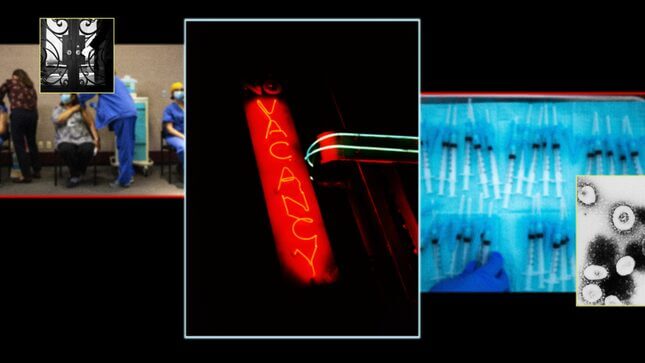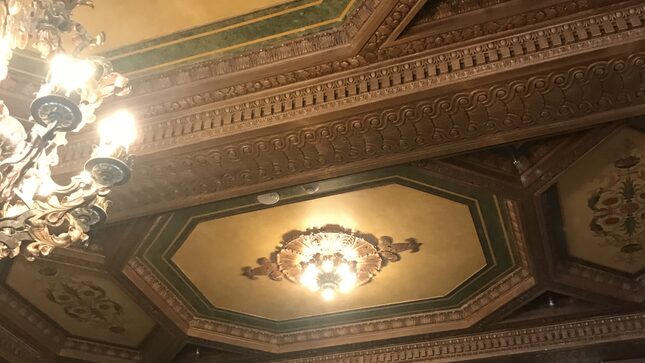Welcome to Hotel Vaccine
Latest
Graphic: Elena Scotti (Photos: Getty Images)
The hotel, a gaudy building in downtown Syracuse, New York, housed child stars and politicians in the decades after it opened in 1924. Presidents Eisenhower, Kennedy, and Carter stayed there, as did Charles Lindbergh, on tour to celebrate his trans-Atlantic flight. The stairs leading to a cavernous lobby are covered in a rosy carpet that’s seen better days; chandeliers emerge framed by ornate painted ceilings, every surface carved or embossed. Behind a long row of gilded guest check-in booths—sparsely populated these days, though the desk could easily house half a dozen clerks—hangs a 40-foot mural portraying the city’s history, painted in 1948 and recovered during a renovation in the mid-2010s. It prominently displays the salt springs discovered by the shores of a local lake; the segment featuring an enslaved man in shackles has been not-so-discreetly covered up.
The operation, owned and recently restored by a national chain, has fallen on hard times for reasons that should be obvious, which is probably why it’s possible to get a room for so cheap. Almost a year ago, the city’s St. Patrick’s day was canceled, the first in a long line of aborted conferences and weddings and tourism events that would shrink the number of paying guests to nearly zero. Last spring, the hotel furloughed hundreds of its employees, leaving a skeleton crew of less than 50 to care for its 200-odd guest suites and watch over its empty grand ballroom and the painted “Persian Terrace.”
But then Andrew Cuomo directed the National Guard and state health department to staff an expansive fairground a few miles away. As of late last week, the mass vaccination site was deploying various forms of the jab a full 24 hours a day. Finding myself in isolation close to Syracuse and having some deeply weird stuff going on in my ribcage, I took one of those shots.

Just as quickly as the pandemic had emptied the historic hotel, its antidote appeared to be refilling it, much to the confusion of the small crew on duty Sunday night. In the space of about 15 minutes, a few days after the fairground received Johnson & Johnson’s vaccine and began administering it between 10 p.m. and 6 a.m., a handful of parties arrived in the formerly abandoned lobby, standing in a distanced queue and waiting to check in. The single, affable clerk behind a plexiglass barrier was frequently interrupted by phone calls, apologizing for not remembering a guest on the other side of the line who appeared to be thanking him profusely for a recent stay. “Second floor? I’m not sure. We’ve just had so many people here for the vaccine.”
Exactly a week ago, New York Governor Andrew Cuomo announced a pilot program to bring the most recently approved vaccine, a Johnson & Johnson entry notable for being a “one-and-done” situation and for providing what most health experts say is a negligible decrease in efficacy, to mass inoculation sites operated by the states. The three existing sites—two in New York City, one in Syracuse—would continue to administer Pfizer vaccines during the day and open thousands of overnight appointments for the new jab “to ensure an efficient and streamlined administration of the Johnson & Johnson vaccine,” the governor said.
Registration for the over 4,000 appointments at the Syracuse location opened at 8 a.m. on March 4th. By the afternoon of March 5th, the last had been filled. A local outlet interviewed people who had driven more than five hours to get the overnight jab. Soon, the city of Syracuse will begin running free shuttles to the vaccination sites for residents with appointments during the daytime hours. But many eager early adopters of the one-and-done shot are clearly shuttling themselves, with help from the staff of the hotel.
I don’t know what happened tonight but all of a sudden it’s just, like, chaos
Out on the street, a middle-aged valet with a soft demeanor directed traffic, anticipating appointments that would occur in the wee hours of the night. That SUV, he told me, would be departing around 1 a.m.; the owner of the Ford had an appointment at 3:30 a.m. “It’s a good thing to get vaccinated,” he said, shrugging. “It keeps us all safe.” Downstairs, in the pub that doubled as a room service kitchen, the two waitresses on duty were somewhat more disconcerted. The booths were packed, the phone ringing every minute with hotel guests ordering Beyond Burgers and wings. “I don’t know what happened tonight but all of a sudden it’s just, like, chaos,” one noted from behind her disposable mask. “Sundays are never like this.”
Recently, the UC Davis law professor Elizabeth Joh described the vaccine roll-out as a “giant user interface and tech experiment” that was “beta tested on our most vulnerable populations,” which is true. As has been endlessly noted, it takes an immense amount of planning and technical literacy to navigate the labyrinth of landing pages and digital lines that are the gates to inoculation and whatever happens after all this. But it’s also such a stark illustration of more mundane divisions, a cruel experiment in access and will and free time.
No doubt there were many people vaccinated in the pilot program who travelled locally in their hours off of work to receive an inoculation in the dead of night. In the massive expo center illuminated by floodlights, hundreds upon hundreds of people, many of them elderly, marched past bizarre cardboard cutouts of nurses and National Guardsmen flashing thumbs-ups. Some, myself included, cried while they stood in line. Over a faint loudspeaker, someone had improbably made the decision to play Destiny’s Child’s “Survivor.” And I guess we could be classified as survivors. But there are just so many variables that are allowing people to survive covid-19. And one of those unfathomable number of factors involved, apparently, taking advantage of a small corner of an industry briefly revived by the inequality of this self-nominated system of distribution, much to the bafflement of the skeleton crew of hospitality workers slammed by soon-to-be-vaccinated guests making a day of it in a hotel built for flappers and where Elvis once stayed.
It had been especially difficult when the hotel gets busy these days, one of the bartenders told me on Sunday night between pours. Her staff was calling in sick because of covid, unexpectedly unable to come in to work.